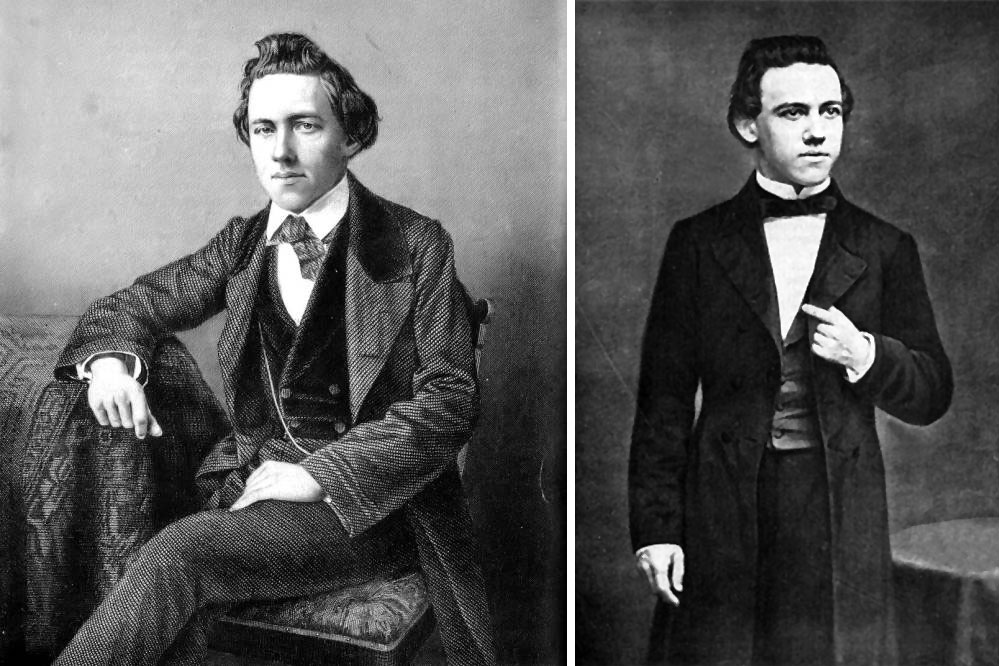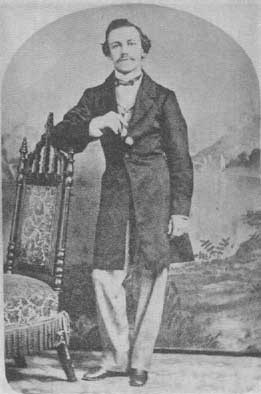


Morphy's opponents often played badly, yet his aggressive and dynamic chess still seems almost perfect. Every move develops a piece, creates a threat or captures an enemy piece, in this case culminating in a queen sacrifice that leads to mate.
The following game was played in 1858 at an opera house in Paris, in the Duke's private box, while they were ostensibly watching a live production!
Today, grandmasters win such games only in simuls. But even top grandmasters can lose quickly if they do not develop their pieces. One example of many is a game between the young Magnus Carlsen and Sergey Dolmatov — the World Junior Champion in 1978 and World Championship Candidate in 1991 — played in Moscow, 2004 at the 3rd Aeroflot Open.
 Paul Morphy was born June 22, 1837, in New Orleans, into a wealthy, respected and influential family. Morphy learnt the rules of chess early and at the age of 13 he arguably was already the best player in America. He convincingly won the 1. American Chess Congress 1857, and one year later, 1858, he travelled to London and Paris to challenge the best European players. Here, too, Morphy proved to be superior and defeated Adolf Anderssen, Johann Jacob Löwenthal and Henry Edward Bird convincingly. Morphy also challenged the English top player Howard Staunton to a match but Staunton again and again found reasons to avoid Morphy.
Paul Morphy was born June 22, 1837, in New Orleans, into a wealthy, respected and influential family. Morphy learnt the rules of chess early and at the age of 13 he arguably was already the best player in America. He convincingly won the 1. American Chess Congress 1857, and one year later, 1858, he travelled to London and Paris to challenge the best European players. Here, too, Morphy proved to be superior and defeated Adolf Anderssen, Johann Jacob Löwenthal and Henry Edward Bird convincingly. Morphy also challenged the English top player Howard Staunton to a match but Staunton again and again found reasons to avoid Morphy.
After his return to the United States Morphy worked as a lawyer, though without much success. He only rarely played chess and in 1867 he completely withdrew from the game. (Photo at right from New Orleans, 1870.) Morphy, who increasingly suffered from mental disorders, died on July, 10, 1884 in New Orleans.
.jpg)
Charles II, Duke of Brunswick was born October 30, 1804 in Brunswick. Both parents died when Charles was still underage and only when he turned 19, October 30, 1823, did Charles became the official ruler of the Duchy. But things did not go his way and after a revolt in September 1830 the Duke fled into exile. But though he lost political power he still kept his considerable wealth.
After fleeing from the Duchy of Brunswick Charles II lived in Spain, England and France until he finally settled in Geneva, Switzerland, where he died August 18, 1873. He bequeathed his fortune to the city of Geneva which in turn erected a memorial that still pays tribute to the Duke.
The Duke was a passionate chessplayer and a strong amateur — even though this is difficult to see in his most famous game. But Tim Krabbé unearthed other games of the Duke (Chess Diary, Entry 217, June 9, 2003) and in one of these games Charles II drew against Daniel Harrwitz, at that time one of the world's best players.
Count Isoard was born October 6, 1804, and comes from the house of d’Isoard-Vauvenargue. Information about his life is scarce but he graduated in 1822 and in 1829 he was distinguished by Pope Pius VIII at the conclave 1829. His death was announced on December 16, 1883, descendants are not known. As Martin Weteschnik found out during his research about the life of Count Isoard the castle of the family of d’Isoard-Vauvenargues was later acquired by Pablo Picasso, who is buried there.
A great fan of Morphy's game against the Duke of Brunswick and Count Isoard was Bobby Fischer. In the following video he shows it on Yugoslavian TV. Translator and moderator is the Serbian journalist Dimitrije Bjelica.
More information about Morphy offers Gisbert Jacoby who revised the historical part of the ChessBase Mega Database 2017, adding a lot of unknown games and historical material. In the following video he presents his findings about Morphy.
Correction October 19 — The Duke of Brunswick became ruler of the Duchy from his 19th birthday in 1823, not (as originally stated) on his birthday in 1815 when he would have been just 11. In fact 1815 was the year his parents died, but he did not become the ruler for a further 8 years.